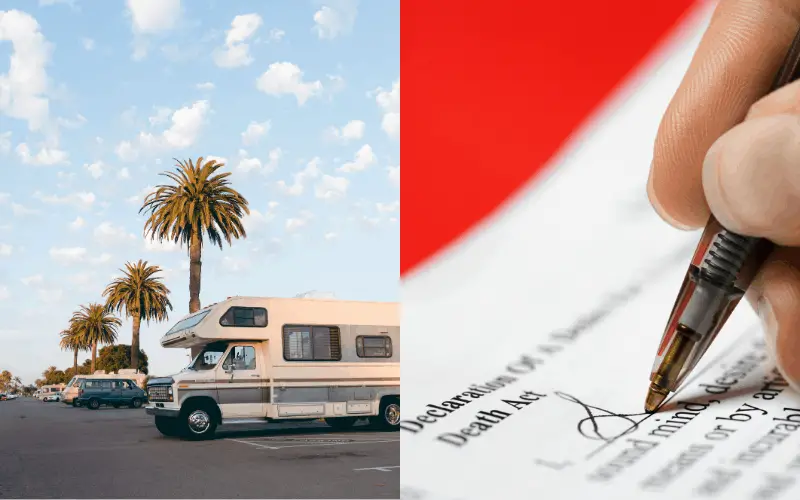Published Date: October 18, 2020
Last Updated on June 22, 2023 by Camper Front
Getting a camper without a title is something you might experience when you buy an RV from a private seller compared to when you buy from a dealer where you will be charged for all the processing and paperwork you will be given.
This is not a bad thing; it just means you will have to go the extra mile for the paperwork yourself. But the fact that you will be getting your RV for a lower price than you would at a dealership should make up for that.
So, if you are wondering how to get a title for a camper without a title, you came to the right article. Let’s quickly look at the process.
Read Also: Pros and Cons of Owning a Campground
Table of Contents
How To Get A Title For A Camper Without a Title
First of all, before we look at how to get a title for a camper, let’s get to understand what a title means.
What is a Title Certificate For an RV?
A certificate of title (it also called a pink slip) is a legal document that says who owns a specific vehicle or RV.
It carries standard information such as the owner’s name and address, the vehicle identification number, and license plate. It serves as a record of ownership that also serves a variety of purposes over the life of a vehicle.
So you can see that a title certificate is a very important document you need to have to avoid legal trouble over proof of ownership; it a proof that the camper is not stolen, and there is not a lien against it.
How to Apply For a Title for Your Camper

There are actually two ways to apply for a new title, the first one being going to your local DMV office and tendering all the necessary documents and fee while the other option is to mail the documents and fee,
although this isn’t really recommended as it may take a longer time for you to receive your new title, around 6-8 weeks. And not all states allow the mail option, its better to walk in there and get every necessary thing done.
To apply for a new title, you are going to need a couple of documents, this includes;
- Title application
- Bill of sale
- DOT or Certificate of inspection
- Proof that there is no lien
- Your driver’s license
The Application Process
You will be required by your state’s DMV to fill out a title form which is downloadable; it is going to ask for information like;
- Date of the transaction
- Amount paid
- Personal information of the buyer and seller
- Name
- Address
- Phone number
- If required, a valid notary stamp.
- Personal information and signatures of two witnesses if notarized.
- If an inspection is required, then it should be stated within the document.
- Amount of deposit or down payment (if any) made before inspection
- Year of vehicle’s manufacturing
- Make and model of the vehicle.
- Vehicle Identification Number (VIN)
- Any other identification numbers
- Amount paid for tax purposes.
- Mileage rating of the vehicle
- Lien information
- Any other information
It is usually recommended to leave out the mileage and signatures blank until you get a notary as they will need to be witnesses firsthand when filling up this information.
If you decide to go ahead and fill in this information without the presence of the notary, they will refuse to sign due to their legal obligation.
You will also need to get the weight of the RV, and there are a few places you can get that; there are garbage dumps, truck stops, recycling centers, or other places that have scales underneath a roadway.
You may need to call ahead to find out if they will complete a certification of weight document as some states require proof of weight when applying for a title.
If you happen to have built your RV yourself, you will need to look up the requirements of a scrap title; people who build their own vehicle from scratch are usually given the title “scrap.” And it is given to vehicles that previously didn’t exist. What you are doing basically is;
- Download the application form through the state’s DMV website or quickly grabbed one from your closest branch
- Fill in all the required information in the form.
- Include the bill of sale, certificate of inspection, and the lien status
- Include the application fees, which are stated on the title application form
- Mail or take the application to the DMV (or take the documents back to the physical location) and wait for their approval
- And if you have built your RV yourself, you also take your scrap title too.
Bill of State
You will also need to fill out the bill of sale in order to complete the application for an RV title. So an RV bill of sale is basically a legal document that records the exchange of ownership of the vehicle from one party to the other in exchange for an amount.
And it requires similar information to the title application, but it might also ask for information like;
- The agreed-upon price and the date of the sale
- Personal and contact information about the seller and the buyer
- Previous tax status
- If there’s an inspection needed by the camper buyer
- If there’s a security deposit made on the camper
- identification number if required.
And like the title application, you have to sign the bill of sale in the presence of a notary. The bill of sale is not only useful in a camper’s title; it can also be used to apply for the seller for taxation. And in case of a change in the campers’ title.
And you are offered a downloadable bill of sale that you can make use of anytime you please.
Read Also: Average Cost of Owning a Campground
Certificate of Inspection
This is another document that you will need to complete. Unlike the title application and the bill of sale, this one isn’t issued through the Department of Motor Vehicles.
This certificate is issued by the department of transportation (DOT), and their job is to inspect the camper to make sure that it is roadworthy. And every state has different inspection requirements. However, most of them check for the following requirements:
- The condition of the wheels and tires
- The side and rear reflectors
- The visibility of the license plate
- The condition of the camper’s brakes
- The tail and headlights.
And rather than scouting for a DOT in your area, many RV dealerships offer inspection services for your camper. But you have to make sure they are authorized, and they issue a certification that the DMV will accept.
Also, most of these dealers go above the DOT minimums and also inspect everything in your RV. So they might just be able to give you advice on where needs fixing or replacing in your new camper.
Importance of a Title
Seeing the “millions” of steps you will have to go through to get a title certificate can be daunting and just skipping it might seem to be a better route, but in are in for a lot if you have to do that;
Legal Laws
Without a title on an RV, you could end up losing your RV if it happens to be stolen, so when you try to get your title certificate, you end up being arrested for suspicion of theft. You can be fined or even jailed.
That’s why it is highly advised that you should always ask for the title and other paperwork from the seller. And if it’s from a legal source without a title, it’s still the property of the previous owner even if you have purchased the camper, and the property rights return to the latest accepted title.
Read Also: Learn How to Build a Lightweight Camper
Conclusion
Knowing how to get a title for a camper might be crucial when you buy a camper without one, you will need to go through some parts process to apply and get a title for your camper to avoid any legal trouble.
However, it is not advised to buy a camper without a title as you run a high risk of buying a stolen camper or one with a lieu on it.

